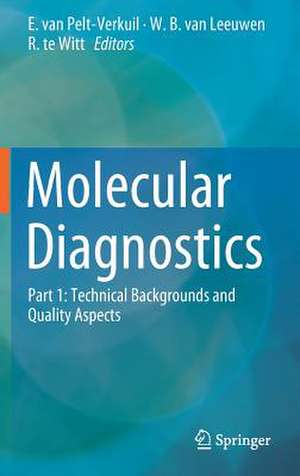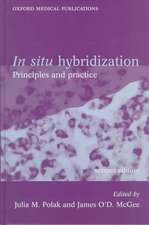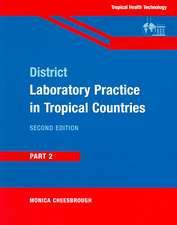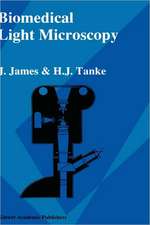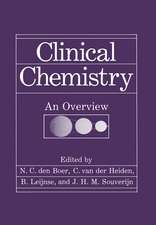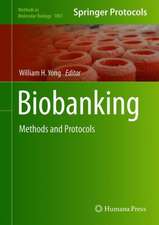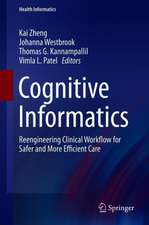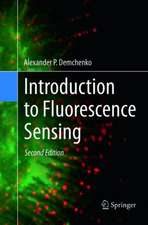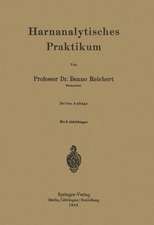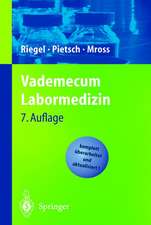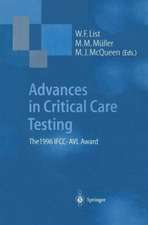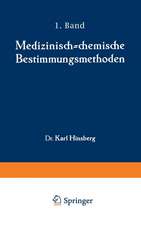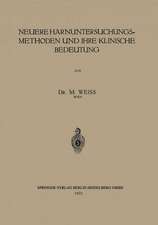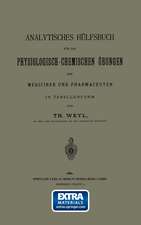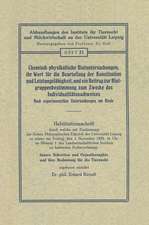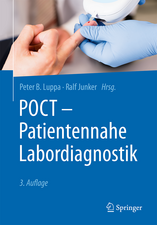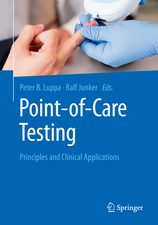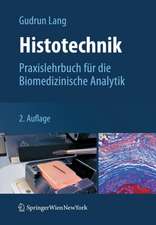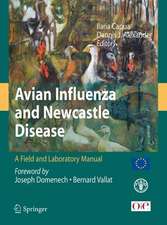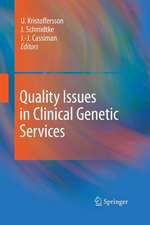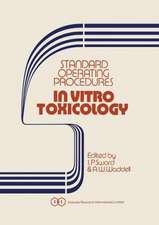Molecular Diagnostics: Part 1: Technical Backgrounds and Quality Aspects
Editat de E. van Pelt-Verkuil, W.B. van Leeuwen, R. te Witten Limba Engleză Hardback – 13 iun 2019
The editors and experts in their respective fields have combined their knowledge to write these two books. Many years of experience in the development, application and quality control of molecular diagnostic methods is reflected herewith.
Molecular Diagnostics Part 1 is dedicated to the theoretical backgrounds of the technologies often applied in molecular diagnostics, in which nucleic acid amplification methods (such as real-time PCR), sequencing and bioinformatics are the basic tools. The assay design and -development, combined with items of trouble-shooting are described in detail. As a foundation of reliable molecular diagnostic assays, the quality control required for validation, implementation and performance of molecular diagnostic assays is thoroughly discussed. This book also provides extensive information for those working with molecular techniques in a wide variety of research applications using conventional and real-time PCR technology, Sanger and high throughput sequencing techniques, and bioinformatics.
Molecular Diagnostics Part 2 highlights the applications of the molecular diagnostic methods in the various diagnostic laboratories, comprising:
- Clinical microbiology- Clinical chemistry - Clinical genetics- Clinical pathology - Molecular hematopathology- Veterinary health- Plant health- Food safety Both full-colour and well-illustrated books are particularly valuable for students, clinicians, scientists and other professionals who are interested in (designing) molecular diagnostic methods and for those who wish to broaden their knowledge on the current molecular biological revolution. The information in the books highlights the trend of the integration of multiple (clinical) disciplines into one universal molecular laboratory.
| Toate formatele și edițiile | Preț | Express |
|---|---|---|
| Paperback (1) | 849.16 lei 38-44 zile | |
| Springer Nature Singapore – 12 dec 2018 | 849.16 lei 38-44 zile | |
| Hardback (2) | 910.65 lei 3-5 săpt. | |
| Springer Nature Singapore – 7 aug 2017 | 910.65 lei 3-5 săpt. | |
| Springer Nature Singapore – 13 iun 2019 | 1047.65 lei 6-8 săpt. |
Preț: 1047.65 lei
Preț vechi: 1102.78 lei
-5% Nou
Puncte Express: 1571
Preț estimativ în valută:
200.53€ • 217.89$ • 168.56£
200.53€ • 217.89$ • 168.56£
Carte tipărită la comandă
Livrare economică 22 aprilie-06 mai
Preluare comenzi: 021 569.72.76
Specificații
ISBN-13: 9789811316036
ISBN-10: 9811316031
Pagini: 256
Ilustrații: VII, 457 p. 224 illus., 205 illus. in color.
Dimensiuni: 155 x 235 x 34 mm
Greutate: 0.83 kg
Ediția:1st ed. 2019
Editura: Springer Nature Singapore
Colecția Springer
Locul publicării:Singapore, Singapore
ISBN-10: 9811316031
Pagini: 256
Ilustrații: VII, 457 p. 224 illus., 205 illus. in color.
Dimensiuni: 155 x 235 x 34 mm
Greutate: 0.83 kg
Ediția:1st ed. 2019
Editura: Springer Nature Singapore
Colecția Springer
Locul publicării:Singapore, Singapore
Cuprins
The importance of nucleic acids in diagnostics.- Background and analysis of nucleic acids.- Primers and probes.- Basic principles of nucleic acid hybridisation.- Principles of PCR.- Quality assurance, management and control in molecular diagnostics.- Quantitative isothermal molecular amplification techniques.- DNA sequencing.- Bioinformatics.- The ongoing revolution of MALDI TOF Mass Spectrometry for Molecular Diagnostics.- Information in the amplification curve.
Recenzii
“This book is intended for anyone working with molecular diagnostics, including ‘research laboratories in many disciplines and for (post)graduate education.’ This is a very broad audience and an accurate assessment of who would be interested. … This is a great book to get you up to speed on the technical fundamentals of molecular diagnostics. I highly recommend it.” (Valerie L Ng, Doody's Book Reviews, September 13, 2019)
Notă biografică
E. van Pelt-Verkuil
Elizabeth van Pelt-Verkuil, born in Rotterdam, The Netherlands has been involved in the development of new techniques in both molecular - and cell biology for more than 40 years. From the first PCRs in 1985 up to now, Elizabeth participated in its development and the applicability in molecular diagnostics. First in pathology, later combined with microbiology. In the meantime her focus changed from research to diagnostics. After graduation in cell biology and biochemistry at University Leiden in 1975, Elizabeth got her PhD on (experimental) developmental biology in 1979, followed by a post-doc position on experimental arteriosclerosis. From 1982 onward, she was a lecturer and applied scientist at the University of Applied Science Leiden for both graduate and post-graduate education in i.e. molecular diagnostics. Elizabeth organised her first theoretical and practical course on PCR and in situ hybridisation for post-graduates in 1987.
Elizabeth was founder of the Centre of Bioscience and Diagnostics in 2001; a department of the before mentioned institute, specialised in post-graduate education. Elizabeth organised and participated in many courses and in-company-trainings on PCR and molecular diagnostics.
During a 5 -year period from 2011 onwards at the Professorship Innovative Molecular Diagnostics at the University of Applied Science Leiden, Elizabeth focused on the implementation and embedding of new laboratory developed qPCR tests for the detection and identification of viral pathogens, including all aspects of quality control. Since 2016 Elizabeth is owner of and consultant at “Quality and Innovations in Molecular Diagnostics”, a company which is specialised in implementation, quality control and education in the field of molecular diagnostics.
Elizabeth van Pelt-Verkuil is a member of the Dutch Society of Medical Microbiology (NVMM) and participates in the Study group of Molecular Diagnostics of Infectious Diseases (WMDI).
Elizabeth van Pelt-Verkuil is editor/author of 2 Dutch books on Molecular Diagnostics and a textbook on PCR.
E. van Pelt-Verkuil et.al. Moleculaire Diagnostiek (editors/author) (1e Ed; in Dutch) 2001. Bohn Stavleu van Loghum; ISBN9-789031331031
E. van Pelt-Verkuil et.al. (author) Principles and technical aspects of PCR amplification (2008). Springer ISBN 9 781402062407
E. van Pelt-Verkuil and W.B. van Leeuwen, Moleculaire Diagnostiek (editors/author) (2nd Ed; in Dutch) 2013. Syntax media; ISBN 9789077423950
W.B. van Leeuwen
Willem van Leeuwen was born in Rotterdam, The Netherlands. He studied Microbiology on the University of Applied Science in Rotterdam (BSc in 1975) and specialized in Medical Biology on the University of Applied Science in Etten-Leur, The Netherlands (MSc in 1982). In 2002 he wrote his thesis “Binary typing of Staphylococcus aureus” and became a specialist in Medical Molecular Microbiology at the Erasmus Medical Center Rotterdam, department of Medical Microbiology & Infectious Diseases. The population structure analysis and host-pathogen interaction of Staphylococcus aureus were the subjects of study during the post-doctoral phase in this department. From august 2002 through 2007 he is responsible for the unit Molecular Diagnostics (validation and implementation of new diagnostic platforms). In February 2007 he was invited to become professor Innovative Molecular Diagnostics at the University of Applied Science of Leiden, the Netherlands and became manager of the research center, “Toplab” in Leiden. In September 2013, he was appointed as professor at the University of Applied Science Leiden. Since september 2017 he became senior professor of the Leiden Centre for Applied Bioscience at the University of Applied Science Leiden.
Since 1996, Willem is a member of the European Society of Clinical Microbiology and Infectious Diseases (ESCMID), Dutch Society of Medical Microbiology (NVMM) and the Study group of Molecular Diagnostics of Infectious Diseases (WMDI).
Willem is an international scientific Expert for diagnostics and subtyping of MRSA for QCMD (Quality Control Molecular Diagnostics) since 2005.
Since 2011, Willem is staff member / instructor of the Dutch National Committee for Medical-Biological Research Training (MMO) in the Netherlands.
Last, but not least, Willem is honorary member of the Iranian Society of Microbiologists since 2010. Willem is editor/author of multiple books in the field of Molecular Diagnostics:
1. E. van Pelt-Verkuil and W.B. van Leeuwen (editors/author). Moleculaire Diagnostiek. (2nd Ed; in Dutch) 2003. Syntax media; ISBN 9789077423950
2. W.B. van Leeuwen and C. Vink (editors/author). Molecular Diagnostics: techniques and applications. IVA publishers, 2009.
3. John P. Hays and W.B. van Leeuwen Eds. The Role of New Technologies in Medical Microbiological Diagnosis and Research. 2012. Bentham Books publishers. elBN:978-1-60805-316-2.
R. te Witt
René te Witt is born in Rotterdam, The Netherlands and is a real “Rotterdammert”. He studied Medical Microbiology and worked as a technician in a diagnostic laboratory for several years, all in Rotterdam. In 2007 he transferred to the Erasmus MC, also in Rotterdam, to write his thesis “Clinical Microbiological Diagnostics 2.0”. After finishing his PhD in 2012, he took charge of the subunit Molecular Diagnostics at the department of Medical Microbiology and Infectious Diseases of the Erasmus MC. Here, he was responsible not only for the day-to-day routine diagnostics, but also for development and implementation of new molecular assays, quality assurance and research projects,.
During 2012, René started his training to become Medical Molecular Microbiologist (MMM), both at the Erasmus MC and the LUMC in Leiden. In 2015 he graduated as MMM and moved to Rijswijk to work as MMM at NMDL (Netherlands Molecular Diagnostics Laboratory), a service laboratory specialized in molecular diagnostics in medical microbiology, virology and pathology.
René is a member of the Dutch Society of Medical Microbiology (NVMM) since 2007 and is one of the editors of the Netherlands Magazine for Medical Microbiology (NTMM) since 2013.
Furthermore, René is member of and participates in the Study group of Molecular Diagnostics of Infectious Diseases (WMDI) since 2007.René joined the editorial team of this book in 2015 because of his excellent skills and broad experience in modern molecular diagnostics in combination with his current position in a rapid expanding laboratory using state-of-the-art molecular diagnostic techniques.
Elizabeth van Pelt-Verkuil, born in Rotterdam, The Netherlands has been involved in the development of new techniques in both molecular - and cell biology for more than 40 years. From the first PCRs in 1985 up to now, Elizabeth participated in its development and the applicability in molecular diagnostics. First in pathology, later combined with microbiology. In the meantime her focus changed from research to diagnostics. After graduation in cell biology and biochemistry at University Leiden in 1975, Elizabeth got her PhD on (experimental) developmental biology in 1979, followed by a post-doc position on experimental arteriosclerosis. From 1982 onward, she was a lecturer and applied scientist at the University of Applied Science Leiden for both graduate and post-graduate education in i.e. molecular diagnostics. Elizabeth organised her first theoretical and practical course on PCR and in situ hybridisation for post-graduates in 1987.
Elizabeth was founder of the Centre of Bioscience and Diagnostics in 2001; a department of the before mentioned institute, specialised in post-graduate education. Elizabeth organised and participated in many courses and in-company-trainings on PCR and molecular diagnostics.
During a 5 -year period from 2011 onwards at the Professorship Innovative Molecular Diagnostics at the University of Applied Science Leiden, Elizabeth focused on the implementation and embedding of new laboratory developed qPCR tests for the detection and identification of viral pathogens, including all aspects of quality control. Since 2016 Elizabeth is owner of and consultant at “Quality and Innovations in Molecular Diagnostics”, a company which is specialised in implementation, quality control and education in the field of molecular diagnostics.
Elizabeth van Pelt-Verkuil is a member of the Dutch Society of Medical Microbiology (NVMM) and participates in the Study group of Molecular Diagnostics of Infectious Diseases (WMDI).
Elizabeth van Pelt-Verkuil is editor/author of 2 Dutch books on Molecular Diagnostics and a textbook on PCR.
E. van Pelt-Verkuil et.al. Moleculaire Diagnostiek (editors/author) (1e Ed; in Dutch) 2001. Bohn Stavleu van Loghum; ISBN9-789031331031
E. van Pelt-Verkuil et.al. (author) Principles and technical aspects of PCR amplification (2008). Springer ISBN 9 781402062407
E. van Pelt-Verkuil and W.B. van Leeuwen, Moleculaire Diagnostiek (editors/author) (2nd Ed; in Dutch) 2013. Syntax media; ISBN 9789077423950
W.B. van Leeuwen
Willem van Leeuwen was born in Rotterdam, The Netherlands. He studied Microbiology on the University of Applied Science in Rotterdam (BSc in 1975) and specialized in Medical Biology on the University of Applied Science in Etten-Leur, The Netherlands (MSc in 1982). In 2002 he wrote his thesis “Binary typing of Staphylococcus aureus” and became a specialist in Medical Molecular Microbiology at the Erasmus Medical Center Rotterdam, department of Medical Microbiology & Infectious Diseases. The population structure analysis and host-pathogen interaction of Staphylococcus aureus were the subjects of study during the post-doctoral phase in this department. From august 2002 through 2007 he is responsible for the unit Molecular Diagnostics (validation and implementation of new diagnostic platforms). In February 2007 he was invited to become professor Innovative Molecular Diagnostics at the University of Applied Science of Leiden, the Netherlands and became manager of the research center, “Toplab” in Leiden. In September 2013, he was appointed as professor at the University of Applied Science Leiden. Since september 2017 he became senior professor of the Leiden Centre for Applied Bioscience at the University of Applied Science Leiden.
Since 1996, Willem is a member of the European Society of Clinical Microbiology and Infectious Diseases (ESCMID), Dutch Society of Medical Microbiology (NVMM) and the Study group of Molecular Diagnostics of Infectious Diseases (WMDI).
Willem is an international scientific Expert for diagnostics and subtyping of MRSA for QCMD (Quality Control Molecular Diagnostics) since 2005.
Since 2011, Willem is staff member / instructor of the Dutch National Committee for Medical-Biological Research Training (MMO) in the Netherlands.
Last, but not least, Willem is honorary member of the Iranian Society of Microbiologists since 2010. Willem is editor/author of multiple books in the field of Molecular Diagnostics:
1. E. van Pelt-Verkuil and W.B. van Leeuwen (editors/author). Moleculaire Diagnostiek. (2nd Ed; in Dutch) 2003. Syntax media; ISBN 9789077423950
2. W.B. van Leeuwen and C. Vink (editors/author). Molecular Diagnostics: techniques and applications. IVA publishers, 2009.
3. John P. Hays and W.B. van Leeuwen Eds. The Role of New Technologies in Medical Microbiological Diagnosis and Research. 2012. Bentham Books publishers. elBN:978-1-60805-316-2.
R. te Witt
René te Witt is born in Rotterdam, The Netherlands and is a real “Rotterdammert”. He studied Medical Microbiology and worked as a technician in a diagnostic laboratory for several years, all in Rotterdam. In 2007 he transferred to the Erasmus MC, also in Rotterdam, to write his thesis “Clinical Microbiological Diagnostics 2.0”. After finishing his PhD in 2012, he took charge of the subunit Molecular Diagnostics at the department of Medical Microbiology and Infectious Diseases of the Erasmus MC. Here, he was responsible not only for the day-to-day routine diagnostics, but also for development and implementation of new molecular assays, quality assurance and research projects,.
During 2012, René started his training to become Medical Molecular Microbiologist (MMM), both at the Erasmus MC and the LUMC in Leiden. In 2015 he graduated as MMM and moved to Rijswijk to work as MMM at NMDL (Netherlands Molecular Diagnostics Laboratory), a service laboratory specialized in molecular diagnostics in medical microbiology, virology and pathology.
René is a member of the Dutch Society of Medical Microbiology (NVMM) since 2007 and is one of the editors of the Netherlands Magazine for Medical Microbiology (NTMM) since 2013.
Furthermore, René is member of and participates in the Study group of Molecular Diagnostics of Infectious Diseases (WMDI) since 2007.René joined the editorial team of this book in 2015 because of his excellent skills and broad experience in modern molecular diagnostics in combination with his current position in a rapid expanding laboratory using state-of-the-art molecular diagnostic techniques.
Textul de pe ultima copertă
The books Molecular Diagnostics Part 1 and 2 provide a comprehensive and practical overview of the state-of-the-art molecular biological diagnostic strategies that are being used in a wide variety of disciplines.
The editors and experts in their respective fields have combined their knowledge to write these two books. Many years of experience in the development, application and quality control of molecular diagnostic methods is reflected herewith.
Molecular Diagnostics Part 1 is dedicated to the theoretical backgrounds of the technologies often applied in molecular diagnostics, in which nucleic acid amplification methods (such as real-time PCR), sequencing and bioinformatics are the basic tools. The assay design and -development, combined with items of trouble-shooting are described in detail. As a foundation of reliable molecular diagnostic assays, the quality control required for validation, implementation and performance of molecular diagnostic assays is thoroughly discussed. This book also provides extensive information for those working with molecular techniques in a wide variety of research applications using conventional and real-time PCR technology, Sanger and high throughput sequencing techniques, and bioinformatics.
Molecular Diagnostics Part 2 highlights the applications of the molecular diagnostic methods in the various diagnostic laboratories, comprising:
- Clinical microbiology- Clinical chemistry - Clinical genetics- Clinical pathology - Molecular hematopathology- Veterinary health- Plant health- Food safety Both full-color and well-illustrated books are particularly valuable for students, clinicians, scientists and other professionals who are interested in (designing) molecular diagnostic methods and for those who wish to broaden their knowledge on the current molecular biological revolution. The information in the books highlights the trend of the integration of multiple (clinical) disciplines into one universal molecular laboratory.
The editors and experts in their respective fields have combined their knowledge to write these two books. Many years of experience in the development, application and quality control of molecular diagnostic methods is reflected herewith.
Molecular Diagnostics Part 1 is dedicated to the theoretical backgrounds of the technologies often applied in molecular diagnostics, in which nucleic acid amplification methods (such as real-time PCR), sequencing and bioinformatics are the basic tools. The assay design and -development, combined with items of trouble-shooting are described in detail. As a foundation of reliable molecular diagnostic assays, the quality control required for validation, implementation and performance of molecular diagnostic assays is thoroughly discussed. This book also provides extensive information for those working with molecular techniques in a wide variety of research applications using conventional and real-time PCR technology, Sanger and high throughput sequencing techniques, and bioinformatics.
Molecular Diagnostics Part 2 highlights the applications of the molecular diagnostic methods in the various diagnostic laboratories, comprising:
- Clinical microbiology- Clinical chemistry - Clinical genetics- Clinical pathology - Molecular hematopathology- Veterinary health- Plant health- Food safety Both full-color and well-illustrated books are particularly valuable for students, clinicians, scientists and other professionals who are interested in (designing) molecular diagnostic methods and for those who wish to broaden their knowledge on the current molecular biological revolution. The information in the books highlights the trend of the integration of multiple (clinical) disciplines into one universal molecular laboratory.
Caracteristici
Takes the reader from fundamentals into the backgrounds and the explanation of many techniques (from hybridisation and qPCR to next gen sequencing and bioinformatics)
Unifies techniques that can be used not only in all fields of molecular diagnostics but that are also useful for many other types of laboratories; e.g. preclinical research, agrobotany, biology, ecology etcetera
Is rich illustrated
Describes validation and quality control; MIQE criteria and prophiency studies are integrated
Unifies techniques that can be used not only in all fields of molecular diagnostics but that are also useful for many other types of laboratories; e.g. preclinical research, agrobotany, biology, ecology etcetera
Is rich illustrated
Describes validation and quality control; MIQE criteria and prophiency studies are integrated
